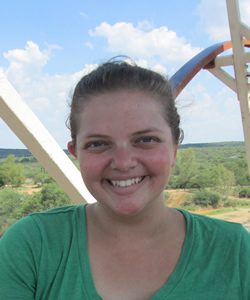I grew up in a bilingual household, and balancing the Hungarian I speak at home with the English I speak everywhere else comes naturally to me. Before coming to Botswana, however, I’d never been in an environment where everyone switches back and forth all the time. Not only is English not everyone’s main language, but Setswana sometimes isn’t their only second language, either. My school, the University of Botswana, uses English, as do most major institutions, but professors often lapse into Setswana mid-lecture or tell a joke on the side that none of us internationals can understand. The newspapers have English and Setswana articles side by side, sometimes mixing in a few sentences in the other language. On the phone people slide by back and forth with ease until they realize I’m totally lost and graciously switch back to our common tongue.
About 80 percent of Botswana speak Setswana, the national language, but documents and government work are written primarily in English, the official language. More than 20 languages are spoken in the country, but many minority languages do not have fully developed writing systems, and only Setswana and English are used in schools. Schools switch from teaching in Setswana with some English lessons to teaching fully in English after a few years in primary school, forcing students to catch up quickly. Since other languages are not accommodated in schools, students whose mother tongue is not Setswana face even more challenges, as they have to learn two languages simultaneously.
The implications of linguistic mainstreaming are serious; language is an integral part of culture. In addition, minority language speakers face an inherent academic disadvantage when required to use a different language in school. This is not a problem unique to Botswana, and policymaking will have to be careful: education and public life should be inclusive to all, but it is difficult to accommodate everyone. At independence, less than 50 years ago, the leaders of the new country sought to build a unified nation, encouraging Setswana to be the nation’s language. By most measures, they were fabulously successful—not only has Botswana avoided the stereotype of African ethnic conflict, but it has created an independent, strong economy and progressed strongly on many development indicators.
Today, the government of Botswana is committed to protecting indigenous languages on paper, but in reality it requires Setswana to be taught in schools and for local communities to make provisions for other languages if parents request their instruction. This is often impossible, impractical, or far too expensive; when given the option of studying a third language in high school, students often choose French instead of an indigenous language.
Just across the border, South Africa faces a similar problem—with 11 official languages enshrined in the constitution, I was told on a visit that anyone is fine as long as they speak either English, Afrikaans, Zulu, or Xhosa. But the reality is that English is the dominant language in Southern Africa, and it is always gaining ground. In Botswana too, people want to master their English because it’s useful. English is good to have on a resume and it’s necessary for Batswana who want to find work in South Africa (youth unemployment is a big problem here). English is necessary for higher education and for communicating with foreigners who come to study, work, tour, and invest in Botswana.
The only time I’ve had problems communicating in English in more than two months here was talking with the cleaning lady in my dorm. She speaks very little English, and when she realized I was taking a Setswana class, she tried for weeks to have a full conversation with me. Slowly I worked my way up from "Dumela mma! Le kae? Ke teng!" ("Hello! How are you? I am well!") to explaining where I came from, where I was traveling to, and of course the fallback phrase for complicated discussions—Ga ke itse Setswana thata: I don’t understand a lot of Setswana. It’s a difficult language, and it’s very different from the European languages I’ve studied in the past—except for some English words for modern things (cliniki for clinic), Setswana has virtually no grammatical or vocabulary connections.
Botswana boasts a fascinating fusion of its two main languages in everyday life; the malls are full of English while the markets just outside buzz with salesmen advertising their wares in Setswana. The ease with which conversations bend back and forth between the two languages is impressive. The two-stepped dominance of these languages—English the international standard, Setswana the national—over the minority languages is worrying. I would love to return to Botswana in 15 or 20 years to observe its development in terms of political stability, economic diversification, and public health, but also to see its linguistic progress. Will these smaller languages, like Kalanga and Sekgalagadi, flourish or falter? Will Setswana gain ground in professional and academic circles, or will the separation between private and public language use widen?
Dumela, or hello, comes from the Setswana word that means to believe—greeting someone literally means “I believe we are friends.” Balancing languages and cultures is difficult, but I believe there is a commitment to cultural preservation and diversity that will protect and empower these minorities.

